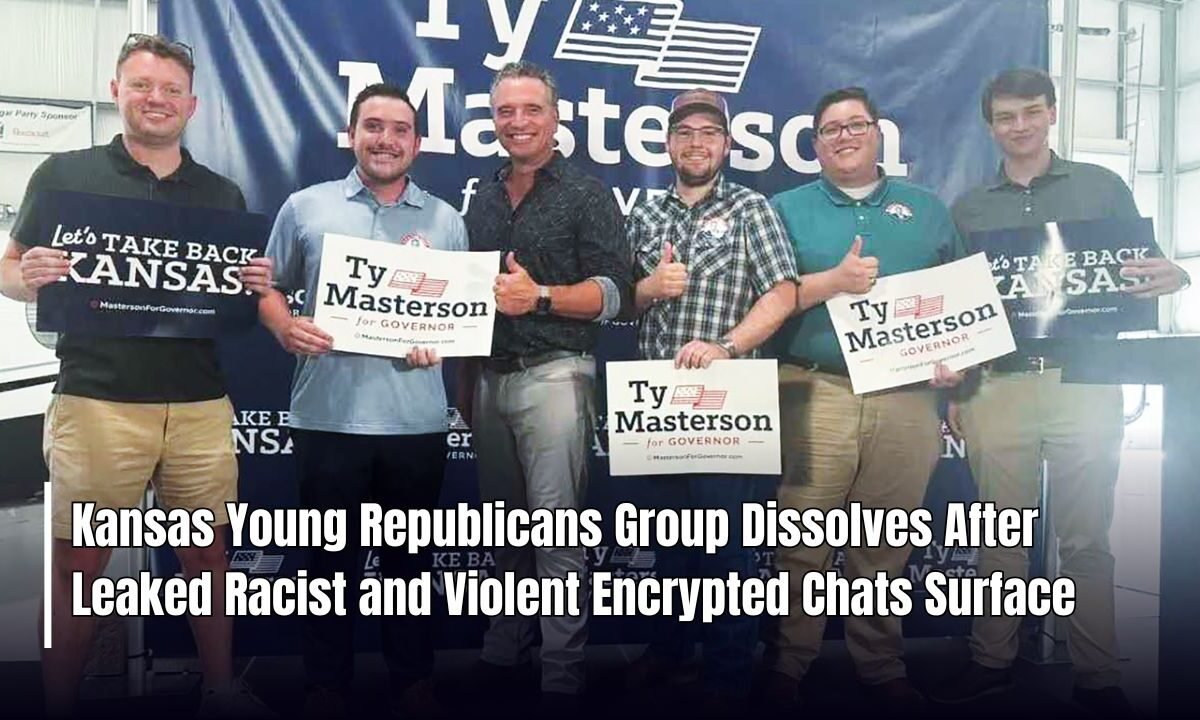In a troubling revelation, encrypted group chats involving the Kansas Young Republicans’ chairman and vice chairman surfaced, filled with violent, racist, and antisemitic rhetoric.
The discussions also interwove references to white supremacist symbolism and efforts to suppress the Jeffrey Epstein files.
Chat Exposure and Organizational Shutdown
After Politico published its exposé of the chats, the Kansas Republican Party announced the immediate deactivation of the Kansas Young Republicans.
The report detailed how Alex Dwyer (chair) and William Hendrix (vice chair) participated in a Telegram group chat rife with hateful commentary.
Offensive Language, White Supremacy Signals, and Epstein Commentary
- Over 2,900 pages of chat transcripts show Hendrix celebrating Missouri GOP leaders’ hostility toward LGBTQ+ individuals and repeatedly using racial slurs targeting Black Americans. In one message, he asked if someone ordering chicken wanted “some watermelon and Kool-Aid with that.”
- Hendrix was dismissed from a communications role in Attorney General Kris Kobach’s office just before the Politico story broke—Kobach said the comments were “inexcusable” and ordered his firing immediately.
- Within the chat, Dwyer and others debated how GOP strategists might smear a political rival by associating them with white supremacism, but rejected the tactic for being too risky in Kansas.
- One participant asked others to guess their hotel room number; Dwyer answered “1488” — a coded white supremacist reference combining the 14 Words slogan and “88” (for “Heil Hitler”).
- Dwyer also weighed in on efforts to release Epstein-related documents, writing, “Trump’s too busy burning the Epstein files.”
Political Fallout & Rejection by Peers
- Neither Dwyer nor Hendrix responded to interview requests. Hendrix had previously run unsuccessfully for Topeka City Council in 2021.
- Before the chat story went public, both had appeared onstage with Senate President Ty Masterson at his gubernatorial campaign launch, holding campaign signs.
- Masterson’s campaign later denied any ties: he claimed neither individual had ever volunteered or worked for him, calling attempts to link them “deceitful.” He emphasized that his Christian faith and history condemn hateful rhetoric.
- A diverse array of Kansas Republican leaders and a Democratic gubernatorial candidate denounced the messages, which were posted under the chat label “RESTOREYR WAR ROOM.”
- The chat logs, spanning January through August, involved GOP operatives from multiple states including Kansas, Vermont, Arizona, and New York. One message ominously warned, “If we ever had a leak on this chat, we will be cooked.”
- Former Kansas Governor Jeff Colyer, now seeking the GOP nomination, declared the views expressed were not reflective of Kansans, reaffirming equality under God.
- Vicki Schmidt, current state insurance commissioner and GOP gubernatorial contender, demanded Dwyer and Hendrix resign, calling their conduct “disgusting” and damaging to Kansas’ reputation.
- Democratic candidate Senator Cindy Holscher expressed outrage, arguing the remarks amounted to extremism and dangerous violence endorsed by party operatives.
- The newly elected Kansas GOP chair, Danedri Herbert, a Black woman, condemned the comments as antithetical to Republican principles and Kansas values of equality and religious freedom.
- The Kansas Black Republican Council also issued a strong rebuke, calling the conduct a betrayal of core party principles: belief in liberty, human dignity, and equality.
The disclosure of this chat has triggered major fallout: the Kansas Young Republicans have been disbanded, multiple GOP leaders publicly disavowed the individuals involved, and calls for accountability are echoing across both parties.
The revelations underscore how extremist rhetoric can threaten not only individual reputations but institutional integrity. The swift responses from state leaders reflect a broader demand: hateful ideologies have no place in respectable political discourse.



